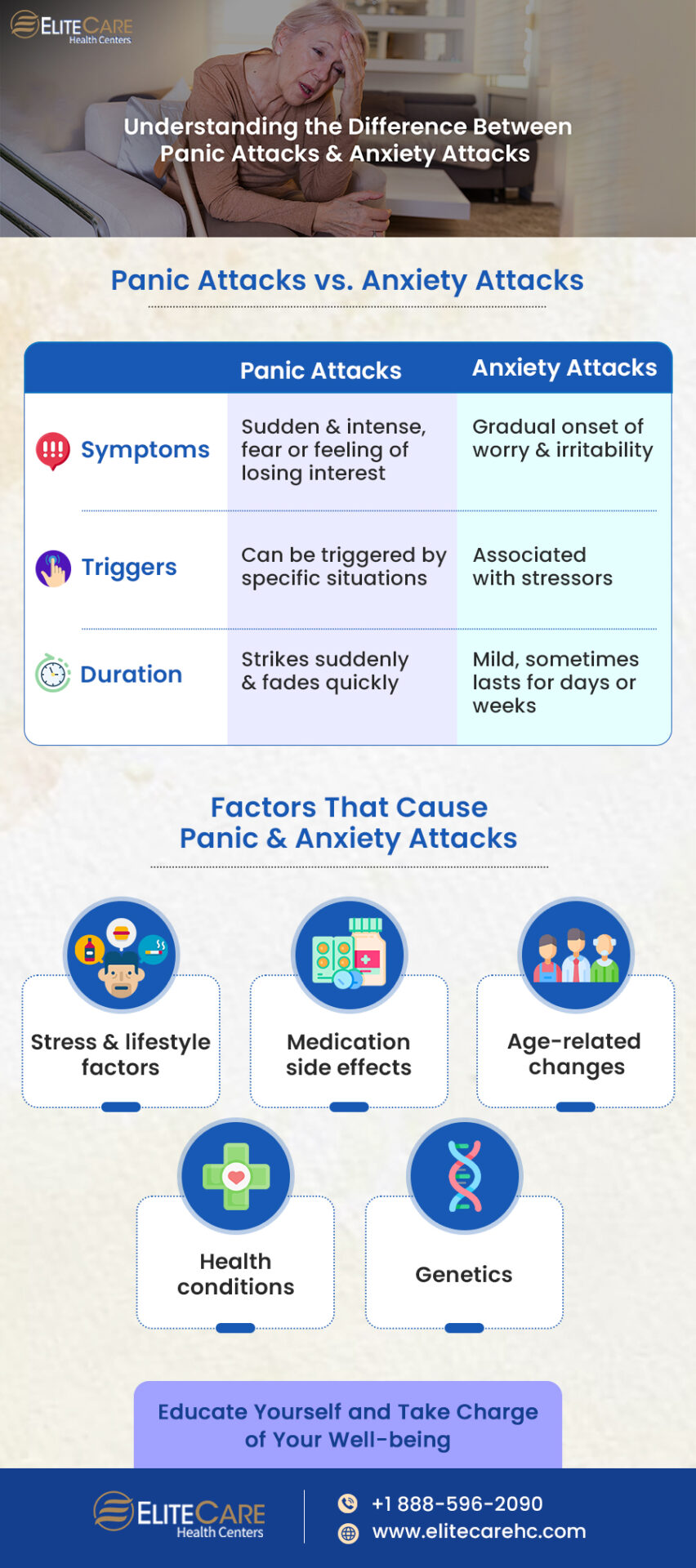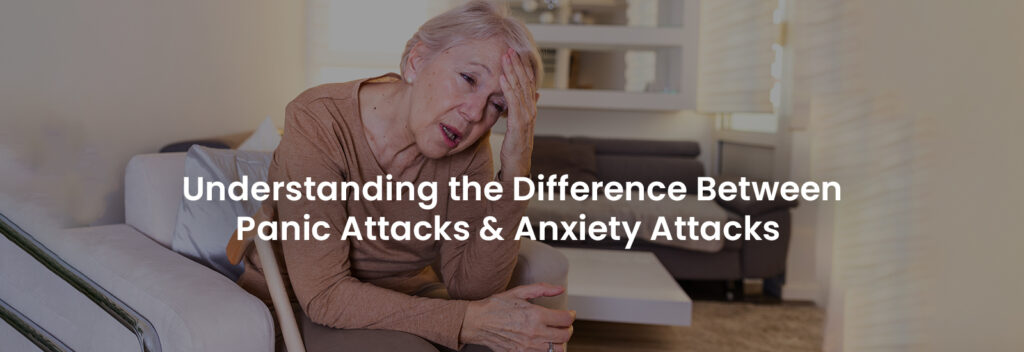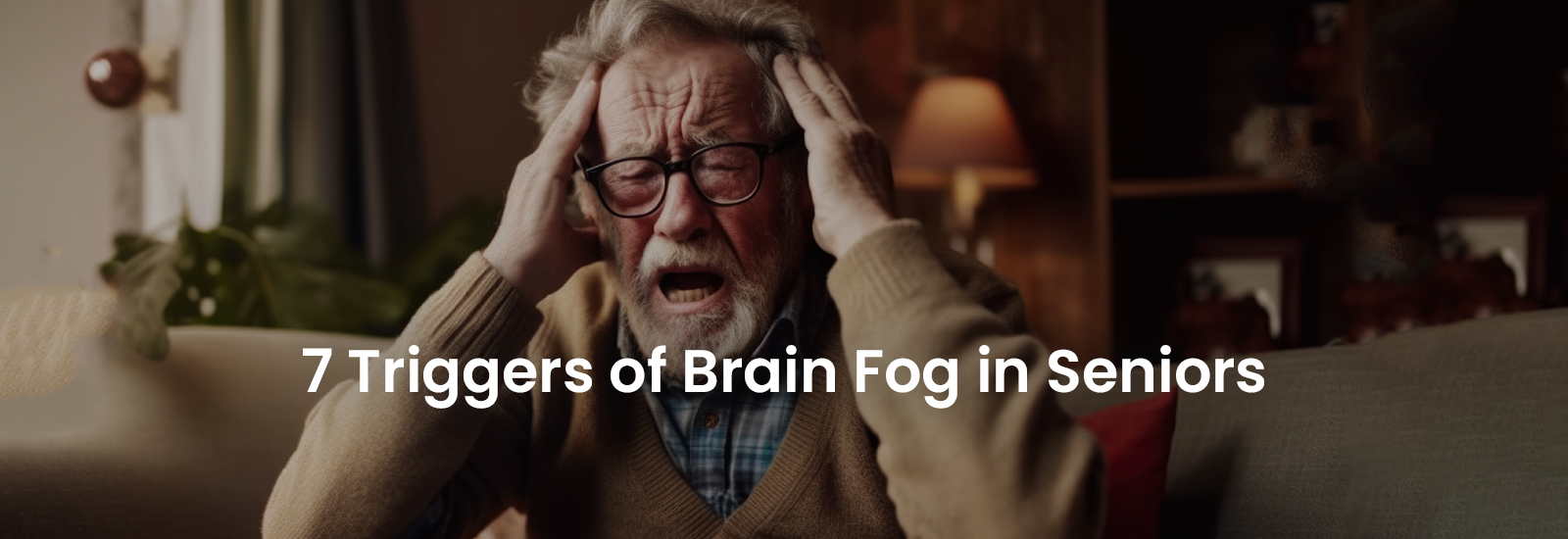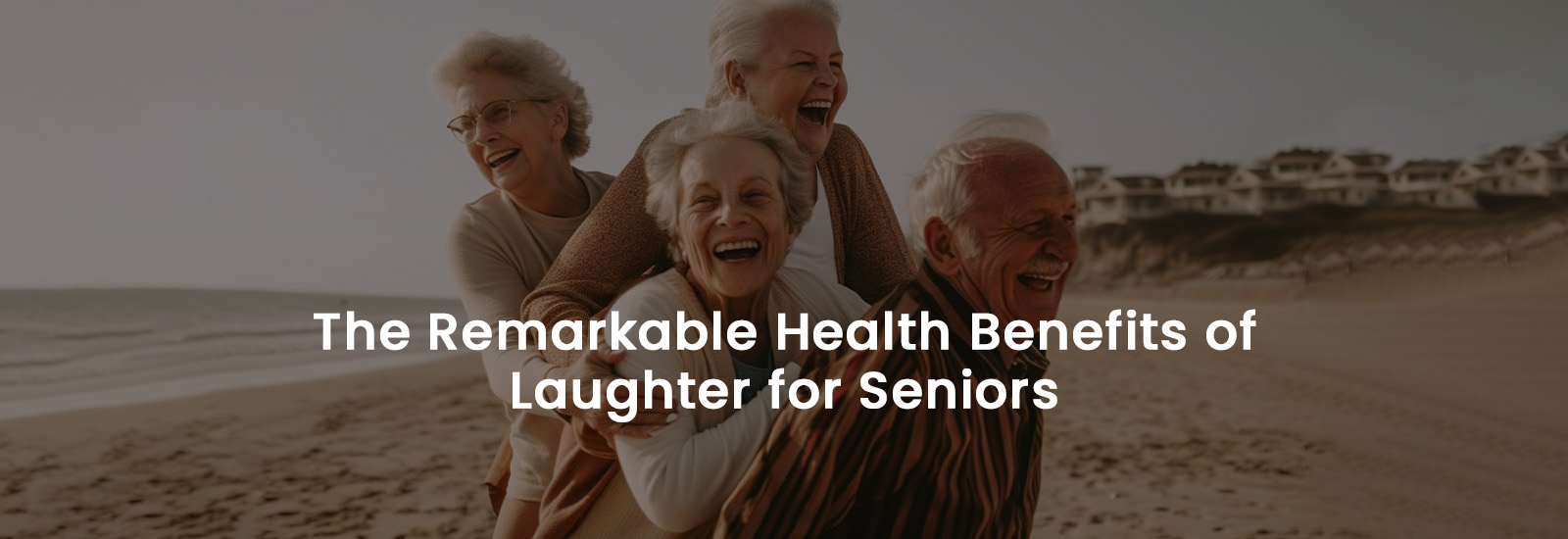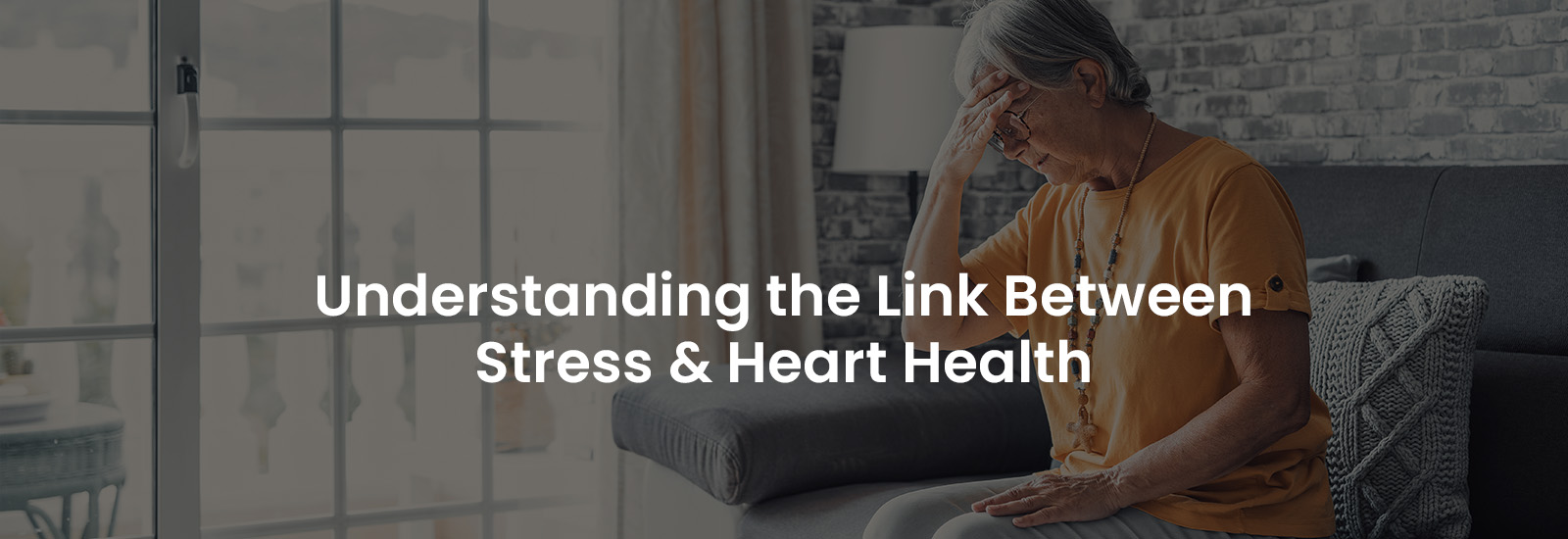
Most of the time, panic attacks and anxiety attacks are confused to be one and the same thing. But they are two different mental health conditions that can significantly impact an individual’s well-being in their own ways. In this blog, we will embark on a journey to unravel the distinctive features of anxiety attacks and panic attacks, shining a light on their manifestations specifically in seniors.
What Is a Panic Attack?
A sudden episode where a person has a feeling of intense fear or discomfort that typically peaks within a few minutes– is called a panic attack. It is characterized by overwhelming physical and psychological symptoms. During a panic attack, individuals may feel detached from reality (derealization) or from themselves (depersonalization). Panic attacks often occur unexpectedly, without identifiable triggers, but they may be caused by specific situations or events.
What Is an Anxiety Attack?
On the other hand, anxiety attacks are associated with a general feeling of fear, anxiety or apprehension. Unlike panic attacks, anxiety attacks typically have a gradual onset and a longer duration. Specific stressors, such as upcoming events, social situations, or personal concerns, often trigger anxiety attacks. However, they can also manifest as chronic and generalized anxiety.
Both panic attacks and anxiety attacks involve feelings of fear and distress.
Panic Attacks vs. Anxiety Attacks
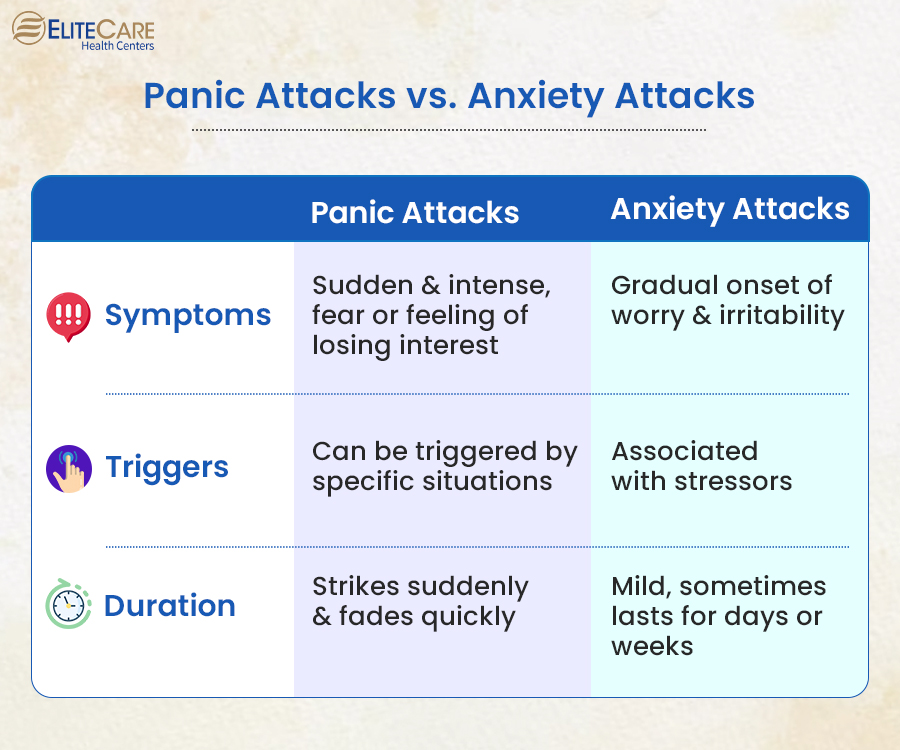
Symptoms
Panic Attacks
- In panic attacks, symptoms are sudden and intense.
- Physical symptoms include rapid heart rate, shortness of breath, chest pain, sweating, trembling, dizziness, and a sense of choking or being smothered.
- Psychological symptoms often involve an overwhelming fear of dying, losing control, or going crazy. Individuals may experience feelings of unreality or detachment from themselves or their surroundings.
Anxiety Attacks
- Anxiety attacks typically have a gradual onset of symptoms.
- Physical symptoms may include muscle tension, restlessness, fatigue, headaches, stomachaches, and an increased heart rate.
- Psychological symptoms manifest as excessive worry, fear, irritability, and difficulty concentrating.
Triggers
Panic Attacks
- Panic attacks are often triggered by specific situations or events, such as crowded places, flying, or public speaking.
- Sometimes, panic attacks can occur unexpectedly without an identifiable cause, indicating panic disorder.
Anxiety Attacks
- Anxiety attacks are typically associated with stressors such as upcoming exams, job interviews, or social interactions.
- They can also manifest as a chronic and generalized state, known as generalized anxiety disorder, persistent in daily life.
Duration and Intensity
Panic Attacks
- Like a lightning storm in the night sky, panic attacks strike suddenly. Pain attacks reach their peak within minutes and fade away relatively quickly.
- The symptoms experienced during a panic attack are intense and overwhelming and often subside within an hour.
Anxiety Attacks
- Anxiety attacks can last longer, ranging from minutes to hours, and sometimes persist for days or even weeks.
- While the symptoms of anxiety attacks are generally milder compared to panic attacks, they can be more persistent and impact daily functioning over a longer period.
By recognizing unique symptoms, triggers, duration, and intensity of both these conditions, healthcare professionals, including primary care physicians and medical clinics, can provide targeted guidance and support. Whether through in-person or online doctor consultations, these professionals can help seniors navigate the complex landscape of their emotions, leading them toward tranquility and well-being.
Leading Causes of Panic & Anxiety Attacks in Seniors
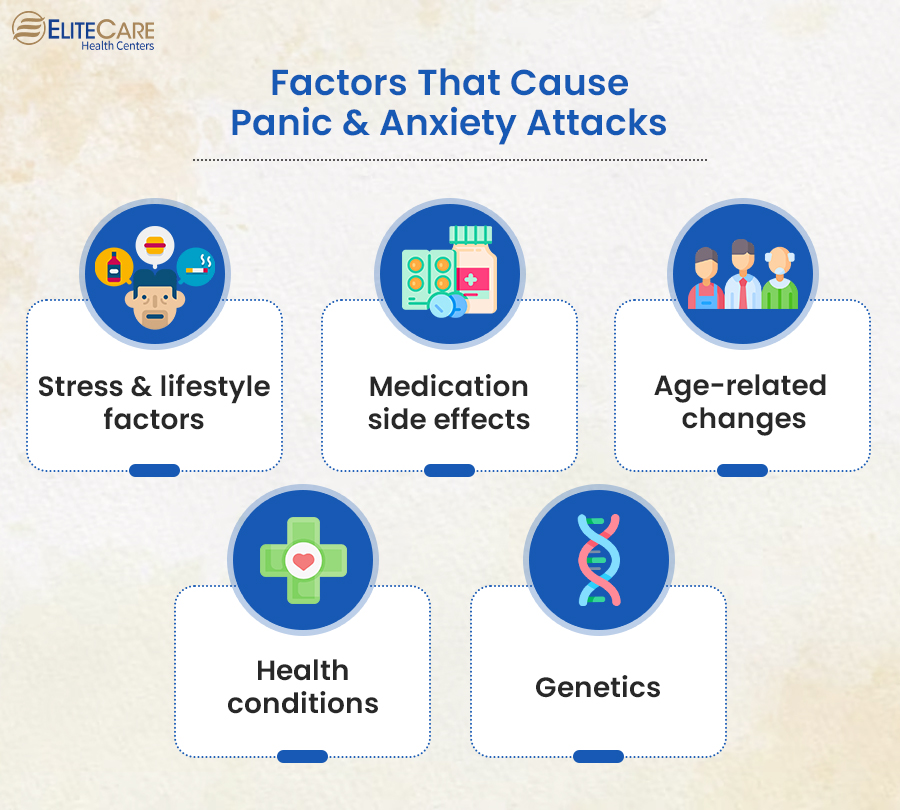
Due to various factors associated with aging, seniors may be more susceptible to experiencing panic attacks and anxiety attacks. Some key factors to consider are as follows:
1. Increased Vulnerability
With age, seniors may face multiple life changes, including retirement, losing loved ones, declining physical health, or financial concerns. These factors can contribute to increased vulnerability to stressors and psychological distress, making seniors more prone to panic attacks and anxiety attacks.
2. Physical Changes
Age-related health conditions like cardiovascular issues or respiratory disorders can lead to heightened physical sensations, such as rapid heartbeat or shortness of breath, which may trigger panic symptoms. Hormonal changes and age-related medication usage can also impact mood and anxiety levels.
3. Cognitive Changes
Cognitive changes, such as mild cognitive impairment or dementia, can increase anxiety symptoms in seniors. Memory loss due to aging or difficulty with problem-solving may increase worries and contribute to the development of anxiety symptoms.
4. Overlapping Health Conditions
Seniors often have other health conditions that commonly coexist with panic attacks and anxiety disorders. For instance, heart conditions like coronary artery disease or atrial fibrillation can cause physical symptoms that mimic panic attacks, leading to misinterpretation and anxiety. Similarly, individuals with dementia may exhibit anxious behaviors due to confusion or environmental changes.
Addressing these unique considerations is crucial for healthcare professionals, health and wellness centers, and caregivers when assessing and managing panic attacks and anxiety attacks in seniors. Annual and routine physical exams become essential in assessing overall health and identifying underlying conditions contributing to these attacks. Through a multidisciplinary approach involving primary care physicians, mental health professionals, and specialists, seniors can receive comprehensive care that addresses their physical and emotional well-being.
Coping Strategies and Treatment Options
When faced with panic and anxiety attacks, equipping individuals with effective coping strategies and treatment options is crucial. Various approaches can be explored within the compassionate space of a medical clinic to alleviate symptoms and promote well-being. Some of the strategies include:
1. Psychoeducation and Self-Help Techniques
- Psychoeducation is pivotal in empowering individuals to understand the nature of panic and anxiety attacks. It enhances self-awareness and provides knowledge about triggers, symptoms, and coping mechanisms.
- Self-help techniques, such as deep breathing exercises, progressive muscle relaxation, and mindfulness meditation, can help manage stress and reduce the intensity of symptoms.
2. Therapy Approaches
Cognitive-Behavioral Therapy (CBT)
Focuses on identifying and challenging negative thought patterns and beliefs contributing to anxiety. It helps individuals develop healthier coping strategies and reshape their perspectives.
Mindfulness-Based Therapy
This approach cultivates present-moment awareness, helping individuals observe their thoughts and emotions without judgment. It promotes acceptance and can be effective in managing anxiety symptoms.
Support Groups
Participating in support groups allows individuals to connect with others who have similar experiences. Sharing stories, insights, and coping strategies within a supportive community can provide comfort and a sense of community.
3. Medications
In some cases, medication may be prescribed to manage symptoms of panic attacks and anxiety attacks. Always consult with a healthcare professional to determine the suitability of medications and monitor potential side effects.
4. Lifestyle Modifications
- Adopting a healthy lifestyle can significantly contribute to managing anxiety. Regular exercise, sufficient sleep, balanced nutrition, and avoiding excessive caffeine or alcohol intake are essential to overall well-being.
- Adopting stress management techniques, such as engaging in hobbies or activities one enjoys, managing time appropriately, setting boundaries, and practicing relaxation exercises, can also play a crucial role in reducing anxiety levels.
Importance of Seeking Professional Help
Within the supportive environment of a health and wellness center or healthcare clinic, individuals can receive the specialized care they need to deal with anxiety and panic attacks. Here are some key aspects to consider when seeking professional help:
Accurate Diagnosis
Consulting healthcare professionals, such as doctors or mental health specialists, is crucial for accurate diagnosis.
Professionals can differentiate panic attacks from anxiety attacks, identify any underlying health conditions, assess the symptoms, and provide an accurate diagnosis guide to develop an effective treatment plan.
Open Communication
Encourage seniors to openly communicate their experiences, thoughts, and concerns with healthcare professionals, as they provide a safe and non-judgmental space for every individual
Being transparent about symptoms, triggers, and the impact on daily life helps professionals better understand the situation and provide appropriate support.
By seeking professional help at a health and wellness center or health care clinic, individuals can receive guidance to manage panic and anxiety attacks effectively.
When To Get Help
Anxiety disorders affect nearly 4% of older adults. Elite Care Health Center is well-equipped to address the specific needs of seniors. Our senior care services ensure that older adults receive comprehensive care that encompasses their physical and emotional well-being. One doesn’t have to face panic attacks or anxiety attacks alone. Reach out, seek support, and embark on a journey toward a healthier and more fulfilling life.
